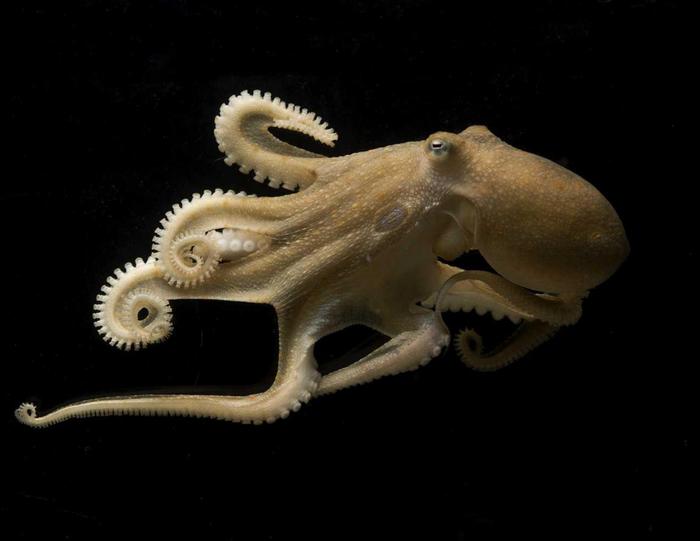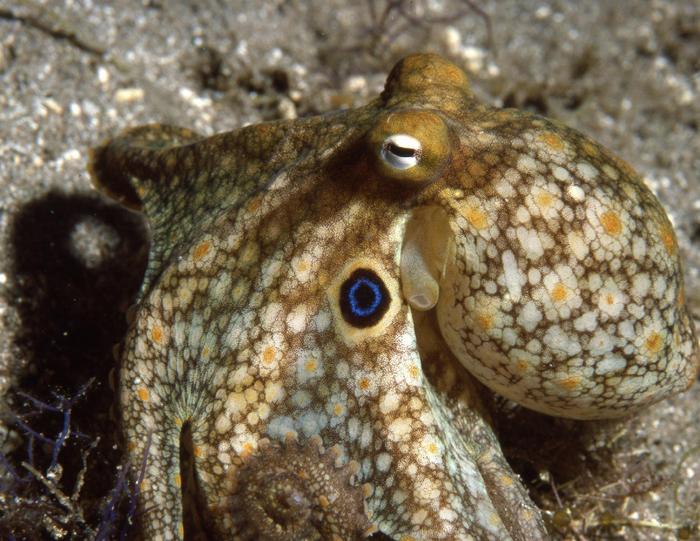
Photo: Tom Kleindinst
Octopuses are fascinating creatures. They're incredibly smart and adaptable. Known to camouflage themselves when in danger and to make a break for it when held in captivity, octopuses are animals that we have a lot to learn from. And a team of researchers is proving that in a new study published in Cell.
The authors, led by Saint Francis University biologist Matthew A. Birk, were curious about the adaptability of these marine creatures. Specifically, they wanted to examine how octopuses are able to survive large temperature fluctuations. If you think about it, humans need relatively constant temperatures to thrive. Our brains are purposely designed to operate at a near-constant temperature. Swing too widely in one direction or another, and our nervous system quickly begins to break down.
Octopuses don't face this problem. Their large brains are unprotected by the skull that we have and often face temperature changes of 20 degrees. But still, they thrive. How do they manage this? It turns out that they're able to rewire their RNA to handle the changes, and they can do so fairly quickly.
If you aren't familiar with RNA, this nucleic acid looks like a single-stranded version of DNA. And while DNA is unchangeable genetic information, RNA is more flexible. Think of it as a genetic management system that can fluctuate if needed. This is what helps the octopuses.
Researchers discovered this by working with the California two-spot octopuses (Octopus bimaculoides). Living off the coast of California and Mexico, they experience warm summers and cool winters. The team caught two California two-spot octopuses and acclimated one to warm water and the other to cold water. Then, they examined their RNA. The results were astounding.

Photo: Roger T. Hanlon
“We found that there were over 20,000 different locations on various different proteins that were edited,” says Birk. Interestingly, they also saw that more RNA was edited when the octopus was in cold water.
When the RNA is edited, it signals that a different type of protein should be produced. And it appears that octopuses are able to account for multiple scenarios and produce the proteins that are best suited to their current situation. To put into perspective how incredible this is, most species—including humans—have only a few percent of their RNA that ever gets tweaked. For octopuses, that number rises to an incredible 60%.
But that's not all. The team also discovered that these changes can happen quite quickly. They did so by working with juvenile octopuses in tanks that were gradually heated or cooled. By measuring the RNA editing over the course of 20 hours, they were able to determine how fast these animals adapt.
“We had no real idea how quickly this can occur: whether it takes weeks or hours,” says Birk. “We could see significant changes in less than a day, and within four days, they were at the new steady-state levels that you find them in after a month.”
Armed with this newfound information about RNA, the researchers are ready to take things a step further. They'll now be exploring whether or not this capability is also used to help with other environmental changes, such as oxygen availability or variable social environments.
h/t: [NPR]
Related Articles:
A Rare Octopus so Adorable It May Be Named for Its Cuteness
Hypnotic 4K Video of Life 14,750-Feet Underwater Will Leave You Breathless
Kind Divers Spend Hours Helping an Octopus Trade a Plastic Cup for a Protective Shell
Octopuses, Squid, Lobsters, and Crabs Now Recognized as Sentient Beings Under New UK Law






















































































